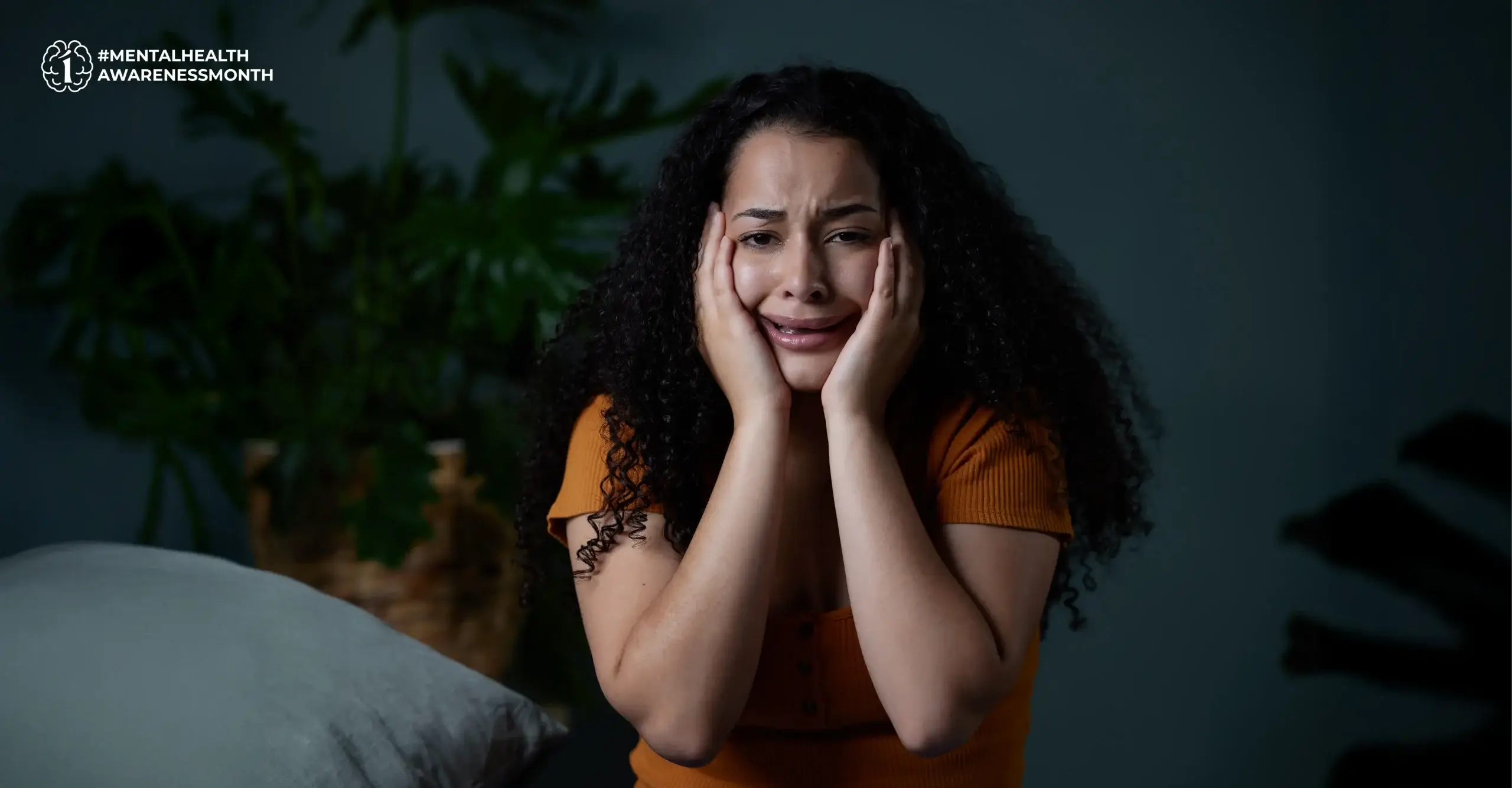
The Untold Link Between Menopause and Anxiety: What Every Woman Needs to Know
Menopause and anxiety are deeply connected, yet most women are never told to expect it. Instead of recognizing it as a symptom of hormonal changes, many women begin to doubt themselves. They chalk it up to external stress, personal weakness, or being “too sensitive,” when in reality, their bodies are undergoing a major transformation.
The shifting levels of estrogen and progesterone during the menopausal transition don’t just affect the menstrual cycle. They also impact brain chemistry, emotional balance, and the body’s ability to handle everyday stress. It’s not just in your head; it’s a biological response to real hormonal shifts.
Understanding this connection is the first step toward feeling more in control and less alone.
What Happens During Perimenopause (and Why It Affects Mental Health)
Perimenopause is the transitional period leading up to menopause, and it can start as early as your late 30s or early 40s. It’s marked by fluctuating levels of estrogen and progesterone, two key hormones that regulate your cycle and support important brain neurotransmitters like serotonin and GABA. When estrogen drops, serotonin levels can dip, impacting mood, sleep, and emotional regulation. Progesterone, known for its calming effect, also declines, which removes another layer of mental stability.
These unpredictable hormonal shifts during perimenopause contribute to why many women experience heightened anxiety—highlighting the strong connection between menopause and anxiety. It’s not simply about aging; the brain is responding to real biochemical changes.
That’s why nearly 4 in 10 women report mood disturbances such as irritability, sadness, low energy, and difficulty concentrating during this phase. This is more than just feeling “off”—it’s a physiological reaction to significant hormonal changes.
Why Anxiety Peaks in Early Perimenopause
Many women report that their anxiety doesn’t slowly creep up during menopause—it surges unexpectedly during early perimenopause. This phase is marked by the most erratic hormone fluctuations, with levels often swinging up and down without warning.
The brain depends on a steady hormonal rhythm to regulate mood and stress, but during early perimenopause, this balance is disrupted. Estrogen plays a crucial role in managing cortisol, the body’s primary stress hormone. When estrogen levels drop unpredictably, the body’s stress response can become overactive, leading to heightened anxiety.
Because of these hormonal shifts, many women who’ve never experienced anxiety before suddenly find themselves overwhelmed, jittery, or on edge over everyday situations. Physical symptoms such as a racing heart, shortness of breath, or a looming sense of dread may also appear, often without an obvious cause.
This intense connection between menopause and anxiety makes early perimenopause a particularly challenging time. Without understanding this link, women often blame themselves or feel frustrated, thinking they should just “snap out of it.” Recognizing that anxiety is a common and real part of the menopausal transition can be the first step toward finding effective support and relief.
Recognizing Anxiety Symptoms During Perimenopause
Not all anxiety feels the same—and during perimenopause, it often shows up in unexpected and deeply physical ways. You might sense that something is off, even when you can’t pinpoint exactly what’s wrong. For many women, this is the first time they experience symptoms of anxiety in such an intense or unfamiliar form.
Some common signs of anxiety during perimenopause include:
- A racing or pounding heart, even when you’re at rest
- Tightness in the chest or feeling short of breath
- Difficulty falling asleep or waking up anxious in the early hours of the morning
- Persistent worry or nervousness, even when life feels otherwise stable
- Overthinking small issues or imagining worst-case scenarios
- Pulling away from social situations or losing interest in daily routines
What makes this stage especially confusing is how different the anxiety feels. You may have always handled pressure well, but now find yourself feeling overstimulated, irritable, or even panicked without an obvious cause. This isn’t a sign of weakness—it’s a reflection of the hormonal upheaval your body is going through.
Understanding the connection between menopause and anxiety is key to making sense of these changes. Hormonal fluctuations, especially in estrogen and progesterone, directly affect neurotransmitters like serotonin and GABA that regulate mood and calm the nervous system. When these hormones become imbalanced, anxiety can take center stage.
Recognizing that you’re not alone—and that this is a common experience shared by millions of women—can help lift the shame, confusion, and self-blame. Anxiety during perimenopause isn’t “just in your head.” It’s a real, physiological response to a complex transition. With the right support and awareness, it can be managed—and it does get better.
What Makes It Worse? Triggers to Watch
While hormonal changes are at the core of menopause and anxiety, certain lifestyle factors can significantly intensify the symptoms. Being mindful of these triggers doesn’t mean eliminating them perfectly—but awareness can help you manage anxiety more effectively during this transition.
Here are some common factors that can make anxiety worse during menopause:
- Poor sleep: Night sweats, insomnia, or frequent waking can disrupt your rest, leaving your nervous system on high alert and more prone to anxiety the next day. Sleep is crucial for emotional regulation, and the lack of it can heighten mood swings and feelings of unease.
- High caffeine intake: Your body may become more sensitive to stimulants like caffeine during perimenopause. What used to be a comforting cup of coffee can now trigger jitteriness, a racing heart, or heightened anxiety.
- Skipping meals: Blood sugar imbalances can mimic or amplify anxiety symptoms. Going too long without eating may lead to irritability, dizziness, or sudden waves of panic, especially if your body is already under hormonal stress.
- Chronic stress: Ongoing stress—whether from work, caregiving, or unresolved emotional strain—can overload your system. When the stress response is already elevated due to shifting hormones, even small stressors can feel overwhelming.
- Sedentary lifestyle: Physical movement boosts endorphins, improves sleep, and helps regulate mood. Without regular exercise, your body may lack the natural mood-stabilizing benefits that can buffer anxiety.
Understanding how these factors interact with menopause and anxiety is empowering. While you can’t always avoid every trigger, small changes—like getting consistent sleep, eating balanced meals, and adding gentle movement to your day—can make a big difference in how you feel.
By identifying and adjusting these triggers, you’re not just managing anxiety; you’re reclaiming a sense of control during a time of major hormonal shifts.
Effective Strategies to Manage Menopause-Related Anxiety
The connection between menopause and anxiety is deeply rooted in hormonal changes, but that doesn’t mean you’re powerless. Even small lifestyle shifts can bring noticeable relief. Managing anxiety during this transition is about creating sustainable habits that support both your body and mind.
Here are some proven strategies that help:
Movement Matters
Regular physical activity is one of the best ways to ease anxiety. Just 20 to 30 minutes of walking, yoga, or strength training can release endorphins and serotonin, which naturally lift your mood. Consistency matters more than intensity, so even gentle movement like stretching or dancing can help.
Prioritize Sleep
Sleep disruptions are common during menopause and often make anxiety worse. A calming bedtime routine, limited screen time, and aiming for 7 to 9 hours of sleep can make a big difference. If night sweats are waking you up, try cooling the room and wearing breathable, moisture-wicking fabrics.
Food for Mood
Balanced meals that include protein, fiber, and healthy fats help keep your blood sugar stable and support hormone health. Nutrients like magnesium (found in leafy greens and nuts) and omega-3s (from flaxseeds, walnuts, or oily fish) can ease mood swings. Try not to skip meals, as this can cause anxiety to spike.
Reduce Stimulants
Caffeine and alcohol can heighten anxiety, especially when your hormones are fluctuating. Consider cutting back and replacing them with calming herbal teas like chamomile, ashwagandha, or tulsi. These herbs can help support the nervous system naturally.
Mind-Body Practices
Simple practices like mindfulness, deep breathing, or meditation can help calm your body’s stress response. Journaling your emotions or tracking your symptoms can also give clarity and emotional release. Just 10 minutes a day can bring a noticeable shift in how you feel.
Talk It Out
Many women feel alone during this phase, but sharing your experience can be incredibly healing. Whether it’s a therapist, friend, or support group, opening up can reduce the emotional burden and remind you that what you’re experiencing is valid and common.
Track Your Symptoms
Keeping a record of your mood, sleep, and menstrual cycle can help you spot patterns. Over time, you’ll better understand what triggers anxiety and what soothes it. This can also be helpful information to bring to your doctor if needed.
Ask About Medical Support
If anxiety is affecting your daily life, consider discussing hormone therapy with your doctor. For some women, it can significantly reduce symptoms when lifestyle changes alone aren’t enough. A healthcare provider can help you explore safe, personalized options.
You don’t have to go through menopause and anxiety alone. The MIROR community is here for you to offer guidance, expert support, and a safe space to connect with other women navigating similar changes. Join us and discover strength in shared stories, practical tips, and compassionate support.
FAQs
Yes, many women experience anxiety for the first time during perimenopause or menopause due to hormonal fluctuations, even if they’ve never had anxiety before.
For most women, anxiety is most intense during the early stages of perimenopause and tends to ease as hormone levels stabilize post-menopause.
If anxiety feels persistent, interferes with your daily life, or comes with intense physical symptoms, consult a doctor to rule out other conditions and explore treatment options.
Hormonal changes affect brain chemicals like serotonin and cortisol regulation, which can make anxiety feel unfamiliar—even if you’ve handled stress well in the past.
If your symptoms are overwhelming or constant, it’s worth discussing options with your doctor. They can assess whether hormone-related support might help and guide you through next steps.

Sonakshi Kandhari





